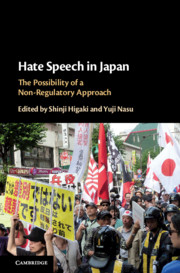Book contents
- Hate Speech in Japan
- Hate Speech in Japan
- Copyright page
- Contents
- Tables
- Figures
- Contributors
- Acknowledgements
- Abbreviations
- Introduction
- Part I Outline
- Part II History
- Part III Legal Framework
- Part IV Cases
- Part V Multidisciplinary Debates
- 15 Free Speech Jurisprudence in Japan
- 16 Japan’s Postcolonial Hate Speech
- 17 A Quantitative and Theoretical Investigation of Racism in Japan
- Part VI Current Issues
- Book part
- Index
15 - Free Speech Jurisprudence in Japan
The Influence of Comparative Constitutional Law*
from Part V - Multidisciplinary Debates
Published online by Cambridge University Press: 15 January 2021
- Hate Speech in Japan
- Hate Speech in Japan
- Copyright page
- Contents
- Tables
- Figures
- Contributors
- Acknowledgements
- Abbreviations
- Introduction
- Part I Outline
- Part II History
- Part III Legal Framework
- Part IV Cases
- Part V Multidisciplinary Debates
- 15 Free Speech Jurisprudence in Japan
- 16 Japan’s Postcolonial Hate Speech
- 17 A Quantitative and Theoretical Investigation of Racism in Japan
- Part VI Current Issues
- Book part
- Index
Summary
This chapter examines how foreign legal doctrine has affected constitutional judicial review in cases involving freedom of expression in Japan. Academics have studied free speech in the context of comparative law because the current constitutional law in Japan, enacted under the instruction of General Headquarters by United States, and the former Meiji Constitution were both influenced by the German Constitution. In the early years of the current Constitution, the Japanese Supreme Court took a ‘public interest’ approach, absent any constitutional standard. Some have proposed a change to this situation, recommending the introduction of a US-style constitutional standard. However, the Supreme Court has not taken that standard to heart. On the commencement of a new law school system in Japan, other scholars advocated the German ‘proportionality’ principle because they thought that it better suited to Japanese case law. However, detailed examination of that case law suggests that the Supreme Court took neither approach. In this chapter, the author seeks to reveal the true nature of the doctrine employed in the constitutional cases and to explore the issue of hate speech from the perspective of this controversy over free speech.
Keywords
- Type
- Chapter
- Information
- Hate Speech in JapanThe Possibility of a Non-Regulatory Approach, pp. 341 - 362Publisher: Cambridge University PressPrint publication year: 2021



